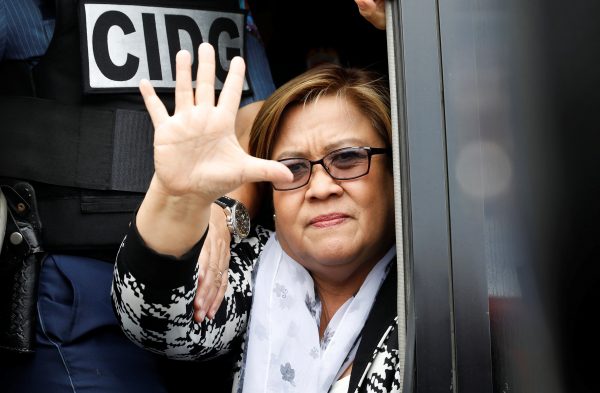On 24 February 2017, after an arrest warrant was issued by the Muntinlupa Regional Trial Court, the former human rights commissioner and later justice secretary turned herself in to police for alleged involvement in the illegal drug trade during the term of former president Benigno Aquino III.
De Lima is currently confined in a jail reserved for high-profile inmates, which houses two other former senators. But the feisty senator is already on the defence, claiming political harassment by the Duterte government, questioning the jurisdiction of the Muntinlupa Regional Trial Court to hear her case and also bypassing judicial hierarchy by asking the Supreme Court to dismiss the drug trafficking charges against her. The Supreme Court is still in the process of deliberating her case.
Compounding de Lima’s misfortunes is the re-emergence of the Janet Lim-Napoles case. Napoles was the key figure in the Priority Development Assistance Fund pork barrel scam exposed in 2013. Solicitor General Jose Calida recently recommended that Napoles be acquitted. De Lima, who was justice secretary at the time, led the charge to arrest Napoles. Napoles was eventually convicted not on corruption charges but for illegal detention of her relative and employee Benhur Luy and sentenced to up to 40 years in jail. But government prosecutors now say that Luy was not deprived of his liberty.
Although the Duterte government has not withdrawn the corruption charges against Napoles, Calida’s recommendation of acquittal now raises the possibility of the ‘pork barrel queen’ testifying against her former persecutors, including de Lima.
De Lima’s current predicament has been attributed by detractors and observers alike to ‘karma’. She had a hand in the indictment and arrest of former president Gloria Macapagal Arroyo and three opposition senators — Jinggoy Estrada, Ramon ‘Bong’ Revilla and Juan Ponce Enrile. All of them were jailed for plunder during Aquino’s term. The Supreme Court recently acquitted Arroyo of the charges against her and also released Enrile from jail for medical reasons.
The use of Philippine courts for punitive actions against political enemies has become more common in recent years. In the early 1990s, political scientist C. Neal Tate studied the post-Marcos Supreme Court and observed the increasing ‘judicialisation of politics’. The judiciary has become a powerful actor in settling policy and political controversies. That power largely derives from the constitutional provision giving the judiciary the duty to settle actual controversies involving rights, and to determine if grave abuse of discretion has been committed ‘amounting to lack or excess of jurisdiction on the part of any branch or instrumentality of government’.
Tate noted that this has led the judiciary to assume activist roles at times because of the failure of the executive and the legislature to resolve policy issues and political controversies. But Tate also argued that continuing judicialisation could be prevented by developing stronger political institutions and institutionalising the Judicial Bar Council, which limits presidential discretion in the Supreme Court appointment process.
Yet even with a strong executive and legislature and the Judicial Bar Council, judicialisation continues. Some have speculated that the Supreme Court’s politicisation (or partisanship) has increased further under current national politics, but the evidence is mixed.
For warring government officials, the judicial system still represents a viable option for punishing opponents for their ‘wrongdoings’.
There are of course other options such as public shaming and impeachment. For instance, during the Aquino administration, the House of Representatives impeached ombudsman Merceditas Gutierrez, who resigned even before the articles of impeachment reached the Senate. Similarly, former chief justice Corona was impeached and convicted by Congress, which eliminated for the Aquino administration a major obstacle in ‘bringing to justice’ officials of the previous administration. Impeachment is now being taunted by both pro-administration and opposition camps in Congress to dislodge Duterte and opposition leader Vice President Leni Robredo.
What is interesting in de Lima’s situation is the politicisation of crime in recent years. Napoles, Luy and the drug lords serving time at the national penitentiary have all been used by political administrations to punish their fiercest opponents.
The European Parliament has added pressure to the government by issuing a call to free de Lima. But shifting public approval and evidence in favour of the ruling administration does not bode well for the once mighty justice secretary.
Eric Batalla is Chair and Professor of the Political Science Department, De La Salle University.

